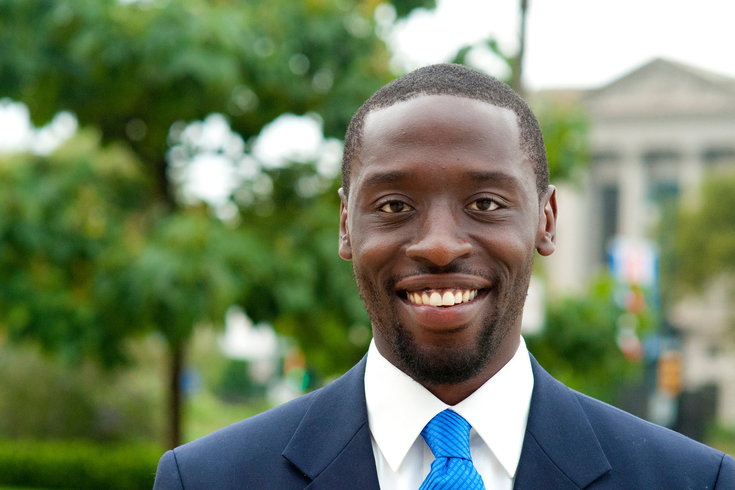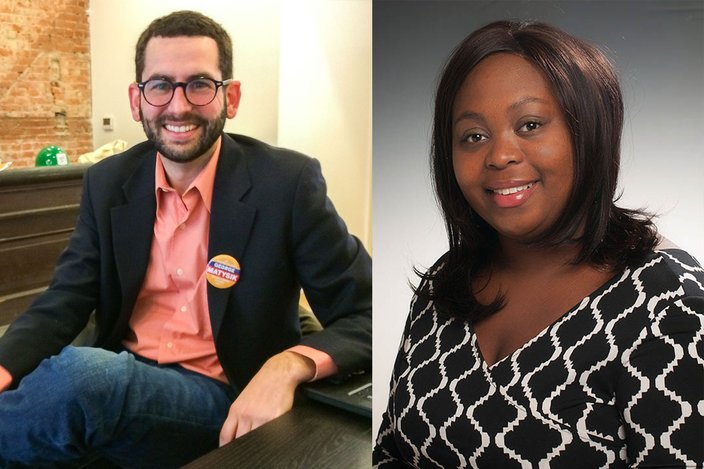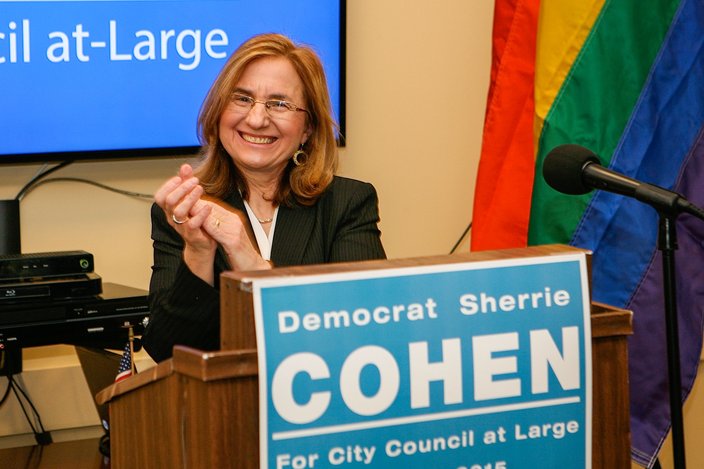
February 09, 2015
 Contributed art /for PhillyVoice
Contributed art /for PhillyVoice
"The most important thing last time that I learned was the role money plays,” Isaiah Thomas said.
Adding to an already crowded Democratic race for city council, Helen Gym, the public schools activist, formally announced Monday afternoon that she is running for an at-large seat.
"Education is the battle ground," Gym said at her launch, according to a transcript of her speech. "It is the clearest expression of the choice before us, between a society, on the one hand, that privileges the few and tolerates inequity and property, versus a vision of a beloved community that is far different."
Gym has already received a major endorsement and a maximum $11,500 contribution from the Philadelphia teacher's union PAC, according to Phillymag.com. Gym and the other candidates will jockey for financial backing, endorsements and name recognition in the run-up to the May 19 primary. Experts say at least $150,000 is required to run a strong race. Not to mention the 1,000 signatures needed just to appear on the primary ballot.
RELATED STORY: Why Philly Latinos lack the representation they deserve
To gauge those challenges, PhillyVoice interviewed three Democratic candidates vying for an at-large seat and one now-former candidate. Two had run before. Two were first-time challengers who have to build their campaigns from scratch.
Three say they are committed. One decided he was not.
George Matysik, 33, opened a campaign office among a series of three-story row houses in East Falls. In late January, he pointed to a blank spot on the floor where he said volunteers would soon be working. Matysik, director of government affairs and public policy for Philabundance, said he was a full-time candidate working to compete in a crowded field.
At the time he called the race an "uphill battle." Perhaps too uphill: last week he dropped out.
"This was clearly a difficult decision," he said in a statement to supporters announcing his withdrawal.
Campaign finance data released last week showed that Matysik trailed some of his opponents in fundraising, and faced a challenging path to money and endorsements. "The fundraising went well, but could always be better," he said. "The bigger issue is having the time ... to be able to commit to making the phone calls and visits."
Those phone calls are key to success, political observers say.
With a $2,900 individual contribution limit imposed on city council races, raising the $150,000 to wage a basic campaign in Philadelphia can be a tough goal. David Thornburgh, president and CEO of the good government group Committee of Seventy, said fundraising can take up a substantial portion of a candidate’s time.
“I was doing a little math to figure out how much time you would have to spend … dialing for dollars to hit various targets,” said Thornburgh, adding that looking at a candidate’s fundraising can be one of the easiest metrics for gauging success.
If a candidate makes three calls an hour and every 10th call results in the maximum $2,900 donation, it would take more than a full month of 40-hour weeks - and calls 24-7 - to reach $150,000, Thornburgh said. Candidates also raise money through fundraisers and by receiving donations from political action committees.
It stands to reason, then, that candidates with a ready-made donor base going into the election are at an advantage.
Sherrie Cohen has run before. A lawyer, tenants rights advocate and longtime LGBT activist, she is the daughter of former city councilman David Cohen. In 2011, she ran for an at-large seat on city council, and missed the Democratic nomination by less than 1,800 votes. After her experience, Cohen says she has a clear fundraising goal and knows where she wants to focus her ground effort.
The more experienced a candidate, the more they talked about the specific fundraising goals seen as necessary for a chance to win.
“I did not know what I was stepping into the first time around,” said Isaiah Thomas, who also ran for city council in 2011, and was known for his time spent meeting voters. He made a respectable showing in the primary. “I was naive to the importance of money.”
Thomas, who works in education, said improving the city's school system is his campaign's primary focus.
“This time around I have no excuses, I know exactly what I’m getting myself into," he said. “If I lose, it will be my fault.”
Of the 17 seats on city council, seven represent the city at-large and aren’t beholden to a specific district. Two of those seats are reserved for Republicans, the minority party, and because Democrats have long dominated Philadelphia politics, those who place in the top five on the at-large Democratic primary ballot in May often end up with a spot on the council. A focus was placed on Democrats for this story because they currently hold the majority of at-large seats.
George Matysik is out; Jenné Ayers is very much in. (Matysik: Michael Phillis/PhillyVoice; Ayers: handout photo)
"An open-seat race is different than running against incumbents," said Randall Miller, an American studies professor at Saint Joseph's University, noting that incumbents on council usually win. A vacant seat provides challengers with a more realistic chance, he said.
Cohen said the experience of running before was a benefit for the 2015 race. She never doubted that she was going to run again.
“When you run for the first time, people don’t know if you are possibly viable,” said Cohen. “But then when you prove that you are by coming so close then people know that you are.”
At 26, first-time candidate Jenné Ayers just clears the minimum age requirement to run. She is the daughter of the former city fire commissioner Lloyd Ayers and is the product of Ivy League schools, including Yale Law School, where she is expected to graduate this year. She readily describes herself as “intense.” Ayers wants to develop a sustainable funding model for the city’s schools and raise the graduation rate - she also wants to get more people involved in city government.
Unlike district races where grassroots outreach can be concentrated, at-large candidates gain votes via name recognition throughout the whole city. Local elections have a traditionally low turnout.
To advertise and succeed, it takes money and the time to raise it. Meanwhile, most have day jobs and other responsibilities.
Sherrie Cohen. (Handout photo)
Thomas, for example, an associate dean at Sankofa Freedom Academy Charter, said he will keep his job and juggle campaign responsibilities outside of his work schedule. His communications director joked that Thomas wouldn't be getting much sleep.
Campaign finance reports released last week show that Thomas had raised $67,688 last year, giving him an end balance of $67,306 after expenses. He was followed by Cohen who raised $61,960. Matysik brought in $16,381. Ayers raised $2,326.
Thomas said he made the mistake of not asking for enough donations the first time around and this time knows better.
“I think the most important thing last time that I learned was the role money plays,” Thomas said. “We are putting a strong focus on trying to fund raise.”
He is already advertising with black talk radio station WURD.
What motivates first-time candidates to get in the race? Often, their personal experience is related by way of explaining what they can offer if elected.
If Matysik had continued with the race, he would have told voters about working his way through the University of Pennsylvania as a janitor making two sets of friends along the way - those who cleaned the school and his fellow students.
Ayers belongs to a family that moved to Philadelphia during the Great Migration, according to her campaign website. Her experience includes working as a press assistant for the state office of President Obama's 2012 campaign. She has also held leadership roles at local non-profits and at one time was president of the local NAACP youth council. For the campaign, she said she will set up her schedule so that she will only have to attend classes at Yale one day a week in order to graduate this May. She can dedicate much of the rest of her time to the election, she said.
Ayers said she wanted to bring new small businesses to the city, it would help to deal with unnecessary redundancies in local government. Asked about the specifics of this proposal, Ayers declined to elaborate. She said she plans to “have a big rollout around my policy proposals" but at this time she didn't “want to get into that level of detail.”
Cohen is running on a progressive platform of raising the minimum wage, getting people out of poverty and stopping police brutality, and can talk in detail on these issues helped in part by the fact that she has run before.
She wants to be able to broadcast that message and platform loud enough to attract a few more voters this cycle.
"My campaign is going to be going door-to-door in neighborhoods where I already won, meaning I was in the top five in 2011," said Cohen. "By focusing more time there, I could increase my vote."
Thomas said he doesn't want to miss what he views as a realistic chance of winning this election.
"Me losing this race this time around would be the biggest failure of my life," he said.

